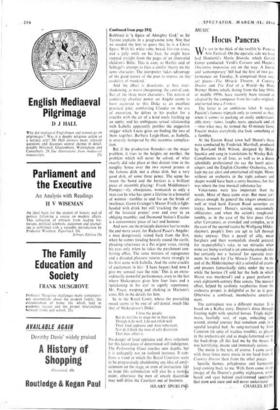MUSIC
floc us Pancras
WE are in the thick of the twelfth St. Pancras Arts Festival. On the operatic side we have had Donizetti's Maria Stuarda, which Gerald Gover conducted. Verdi's Corsaro and Haydn's lincontro improviso are on the way. A fourth and 'contemporary' bill had the first of two per- formances on Tuesday. It comprised three one- act pieces—The Miracle Theatre, A Country Doctor and The End of a World—by Hans Werner Henze which, dating from the late 1940s or middle 1950s. have recently been revised or adapted by the composer from his radio originals and turned into a Trittk.o.
The latter is an ambitious label. It recalls Puccini's famous triptych only to remind us that, when it comes to packing an easily understand- able story—tunes, laughs, tears, spectacle and all —into what -may be termed the 45-minute form, Puccini makes everybody else look something of a fumbler.
At the Euston Road town hall Henze's three were conducted by Frederick Marshall, produced by Rowland Holt Wilson, designed by Helen Spankie and sung in translations by Wesley Balk. Compliments to all four, as well as to a dozen splendidly professional (to say the least) actor- singers and the English Chamber Orchestra, who kept my ear alert and entertained all night. Henze without an orchestra in the right colours and shapes would have been a sorry business, for that was where the true musical substance lay.
Voice-tunes were less important than the words. Most of these came over. But most isn't always enough. In general the singers enunciated well or tried hard. Euston Road acoustics are tricky, however; Henze's scoring occasionally obliterates; and when the action's rough-and- tumble, as in the case of the first piece (farce after Cervantes), or crowded and complex, as in the case of the second (satire by Wolfgang Hilder- sheimer), people's lines are apt to fall through nicks anyway. That a parcel of silly, mean burghers and their womenfolk should pretend, for respectability's sake, to see miracles when none are being worked is an amusing enough idea but certainly not a 'natural' for operatic treat- ment. So much for The Miracle Theatre. At the end of the Hildersheimer skit a salonful of cranks and poseurs fantastically sinks under the wave while the hostess CI sold her the bath in which Marat was murdered') and a guest perform a cock eighteenth-century flute sonata. The musical effect, helped by sardonic raspberries from the orchestra proper, is delightful as far as it goes. Otherwise a confused, inconclusive entertain- ment.
The centrepiece was a different matter. It is based on a Kafka story. Doctor's drive through freezing night with spectral horses. Triple night- mare, fearfully real, of rape, unhealing axe wound, eternal journey that somehow ends in a squalid hospital bed. As sung-narrated by John Cameron (in spite of trachea trouble), as played in the orchestra-pit and as magic-lanterned on to the back-drop, all this had me by the throat. It was horrifying, insane and immensely serious.
The music is the test, of course. I came ayiaY with three times more music in my head from ,4 Country Doctor than from the other pieces.
Specific themes, polyphonies and harmonies keep coming back to me. With them come sharp images. of the Doctor's grubby nightgown, white beard and eyes. behind steel-rimmed spectacles that stare and stare and will never understand.
CHARLES_ REID






































 Previous page
Previous page